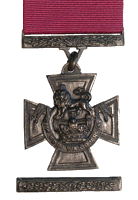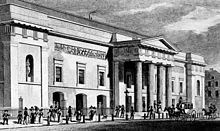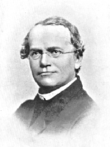
1856
Related subjects: Years
Background to the schools Wikipedia
SOS believes education gives a better chance in life to children in the developing world too. Click here for more information on SOS Children.
| Millennium: | 2nd millennium |
|---|---|
| Centuries: | 18th century – 19th century – 20th century |
| Decades: | 1820s 1830s 1840s – 1850s – 1860s 1870s 1880s |
| Years: | 1853 1854 1855 – 1856 – 1857 1858 1859 |
Year 1856 (MDCCCLVI) was a leap year starting on Tuesday (link will display the full calendar) of the Gregorian Calendar (or a leap year starting on Sunday of the 12-day slower Julian calendar).
Events of 1856
January - June

January 29: Victoria Cross.
- January 8 - Borax is discovered ( John Veatch).
- January 24 - U.S. President Franklin Pierce declares the new Free-State Topeka government in Bleeding Kansas to be in rebellion.
- January 26 - First Battle of Seattle (1856). Marines from the USS Decatur drive off American Indian attackers after all day battle with settlers.
- January 29 - Queen Victoria institutes the Victoria Cross
- February - The Tintic War in Utah.
- February 1 - Auburn University is first chartered as the East Alabama Male College.
- February 2 - Dallas, Texas incorporated as a city.
- February 7 - The nawab of Oudh Wajid Ali Shah is exiled to Metiabruz
- February 18 - The American Party ( Know-Nothings) convene in Philadelphia, Pennsylvania to nominate their first Presidential candidate, former President Millard Fillmore.
- March 5 - Fire destroys Covent Garden Theatre
- March 6 - Maryland Agricultural College (present-day University of Maryland, College Park) chartered
- March 9 - National Fraternity Sigma Alpha Epsilon is founded at the University of Alabama in Tuscaloosa, AL.
- March 20 - Costa Rican troops rout Walker's soldiers
- March 24 - Taiping Rebellion: Suspecting treachery on the part of East King Yang Xiuqing, Shi Dakai garrisons Anhui and begins his march back to the Heavenly Capital, having defeated a strong Xiang Army dettachment.
- March 31 - The Treaty of Paris (1856) is signed, ending the Crimean War
- April 7 - Foundation of Nelson College, Nelson, New Zealand
- April 10 - Theta Chi Fraternity founded at Norwich University
- May 1 - The creation of Isabela province in the Philippines in honour to the Queen of Spain, Queen Isabela II.
- May 16 - the Vigilance Committee founded in San Francisco, California. It lynches two gangsters, arrests most Democratic Party officials and disbands itself on August 18
- May 21 - Lawrence, Kansas is captured and burned by pro- slavery forces (the " Sacking of Lawrence").
- May 22 - Congressman Preston Brooks of South Carolina beats Senator Charles Sumner with a cane in the hall of the United States Senate for a speech Sumner had made attacking Southerners who sympathized with the pro-slavery violence in Kansas (" Bleeding Kansas"). Sumner was unable to return to duty for three years while he recovered. Brooks became a hero across the South.
- May 24 - The Pottawatomie Massacre - group of followers of radical abolitionist John Brown kill five homesteaders in Franklin County, Kansas
- June 2 - Battle of Black Jack between proslavery and antislavery forces, led by John Brown, in Bleeding Kansas.
- June 9 - 500 Mormons leave Iowa City, Iowa and head west for Salt Lake City, Utah carrying all their possessions in two-wheeled handcarts.
- June 13 - Taiping Rebellion: Shi Dakai arrives at Nanjing.
July - December
- July 17 - The Great Train Wreck of 1856 was the worst railroad calamity in the world to date, occurring near Philadelphia, PA, USA.
- July 31 - Christchurch, New Zealand chartered as a city.
- August 10 - Hurricane destroys Last Island, Louisiana - 400 dead. The whole island was broken up into several smaller islands by the storm.
- August 30 - Battle of Osawatomie between proslavery and antislavery forces in Bleeding Kansas.
- September 1 - Seton Hall University was founded by Archdiocese of Newark Bishop James Roosevelt Bayley, a cousin of U.S. President Theodore Roosevelt and nephew of Saint Elizabeth Ann Seton.
- September 2 - Taiping Rebellion: Wei Changhui and Qin Rigang assassinate Yang Xiuqing.
- October 8 - The Second Opium War between several western powers and China begins with the Arrow Incident on the Pearl River.
- November 1 - Anglo-Persian War: War Is declared between Great Britain and Persia.
- November 4 - U.S. presidential election, 1856: Democrat James Buchanan defeats former President Millard Fillmore, representing a coalition of " Know-Nothings" and Whigs, and John C. Frémont of the fledgling Republican Party to become the 15th President of the United States.
- November 11 - Taiping Rebellion: Shi Dakai arrives at the Heavenly Capital once more with 100,000 men and demands that Wei Changhui and Qin Rigang be executed. Shi subsequently becomes head of the government.
- November 17 - American Old West: On the Sonoita River in present-day southern Arizona, the United States Army establishes Fort Buchanan in order to help control new land acquired in the Gadsden Purchase.
- November 21 - Niagara University founded in Niagara Falls, New York.
- December 9 - Bushehr surrenders to the British.
Undated
- Gregor Mendel starts his research on genetics.
- British Country and Borough Police Act extends London police model to all of England and Wales.
- Kate Warne, the first female private detective, begins to work for the Pinkerton Detective Agency
- Pre-human remains found in the Neanderthal valley in Germany.
- National Portrait Gallery in London opened.
- Founding year of St. Paul's School, Camp, Belgaum.
- Western Union is founded.
Ongoing events
- Anglo-Persian War (1856-1857)
- Crimean War (1854-1856)
- Second Opium War (1856- 1860)
- Taiping Rebellion (1851-1864)
Births
| Gregorian calendar | 1856 MDCCCLVI |
| Ab urbe condita | 2609 |
| Armenian calendar | 1305 ԹՎ ՌՅԵ |
| Assyrian calendar | 6606 |
| Bahá'í calendar | 12–13 |
| Bengali calendar | 1263 |
| Berber calendar | 2806 |
| British Regnal year | 19 Vict. 1 – 20 Vict. 1 |
| Buddhist calendar | 2400 |
| Burmese calendar | 1218 |
| Byzantine calendar | 7364–7365 |
| Chinese calendar | 乙卯年十一月廿四日 (4492/4552-11-24) — to — 丙辰年十二月初五日(4493/4553-12-5) |
| Coptic calendar | 1572–1573 |
| Ethiopian calendar | 1848–1849 |
| Hebrew calendar | 5616–5617 |
| Hindu calendars | |
| - Vikram Samvat | 1912–1913 |
| - Shaka Samvat | 1778–1779 |
| - Kali Yuga | 4957–4958 |
| Holocene calendar | 11856 |
| Igbo calendar | |
| - Ǹrí Ìgbò | 856–857 |
| Iranian calendar | 1234–1235 |
| Islamic calendar | 1272–1273 |
| Japanese calendar | Ansei 3 (安政3年) |
| Juche calendar | N/A (before 1912) |
| Julian calendar | Gregorian minus 12 days |
| Korean calendar | 4189 |
| Minguo calendar | 56 before ROC 民前56年 |
| Thai solar calendar | 2399 |
January - June
- January 11 - Christian Sinding, Norwegian composer (d. 1941)
- January 12 - John Singer Sargent, American-born artist (d. 1925)
- February 2 - Frederick William Vanderbilt, American railway magnate (d. 1938)
- February 14 - Frank Harris, Irish author and editor (d. 1931)
- March 4 - Alfred William Rich, English watercolour painter and author (d. 1921)
- March 8
- March 16 - Napoléon Eugène Louis John Joseph, Prince Imperial, son of French Emperor Napoleon III (d. 1879)
- March 20
- April 5 - Booker T. Washington, American educator (d. 1915)
- April 12 - William Martin Conway, British art critic and mountaineer (d. 1937)
- April 24 - Henri Philippe Pétain, French soldier and statesman (d. 1951)
- April 26 - Sir Joseph Ward, 17th Prime Minister of New Zealand (d. 1930)
- April 27 - Tongzhi Emperor, Emperor of China (d. 1875)
- May 6
- Sigmund Freud, Austrian psychiatrist (d. 1939)
- Robert Peary, American Arctic explorer (d. 1920)
- May 15 - L. Frank Baum, American author (d. 1919)
- June 14 - Andrey Markov, Russian mathematician (d. 1922)
July - December
- July 23 - Bal Gangadhar Tilak, Indian political activist (d. 1920)
- July 10 - Nikola Tesla, Serbian inventor (d. 1943)
- July 26 - George Bernard Shaw, Irish writer, Nobel Prize laureate (d. 1950)
- August 10 - William Willett, inventor of Daylight Saving Time (d. 1915)
- August 13 - Alfred Deakin, second Prime Minister of Australia (d. 1919)
- August 15 - Ivan Franko, Ukrainian poet, critic, journalist and political activist (d. 1916)
- September 1 - Sergei Winogradsky, Russian scientist (d. 1953)
- September 18 - Wilhelm von Gloeden, German photographer (d. 1931)
- November 13 - Louis Brandeis, U.S. Supreme Court Justice (d. 1941)
- November 21 - William Emerson Ritter, American biologist (d. 1944)
- November 22 - Heber J. Grant, seventh president of The Church of Jesus Christ of Latter-day Saints (d. 1945)
- November 24 - Bat Masterson, American lawman (d. 1921)
- November 29 - Theobald von Bethmann Hollweg, Chancellor of Germany (d. 1921)
- December 11 - Georgi Plekhanov, Russian revolutionary and Marxist theoretician (d. 1918)
- December 13 - Svetozar Boroević, Austrian field marshal (d. 1920)
- December 18 - J.J. Thomson, English physicist, Nobel Prize laureate (d. 1940)
- December 22 - Frank B. Kellogg, United States Secretary of State, recipient of the Nobel Peace Prize (d. 1937)
- December 25 - Hans von Bartels, German painter (d. 1913)
- December 28 - Woodrow Wilson, 28th President of the United States, recipient of the Nobel Peace Prize (d. 1924)
Deaths
- January 16 - Thaddeus William Harris, American naturalist (b. 1795)
- January 31 - Khedrup Gyatso, eleventh Dalai Lama (b. 1838)
- February 17 - Heinrich Heine, German writer (b. 1797)
- May 3 - Adolphe Charles Adam, French composer (b. 1803)
- June 23 - Ivan Kireevsky, Russian literary critic and philosopher (b. 1806)
- July 9 - Amedeo Avogadro, Italian chemist (b. 1776)
- July 29 - Robert Schumann, German composer and pianist
- August 29 - Mary Anne Schimmelpenninck, British Christian writer (b. 1778)
- August 30 - Gilbert Abbott à Beckett, English writer (b. 1811)
- October 19 - William Sprague III, American politician from Rhode Island (b. 1799)
- December 20 - Francesco Bentivegna, Italian revolutionary (b. 1820)


